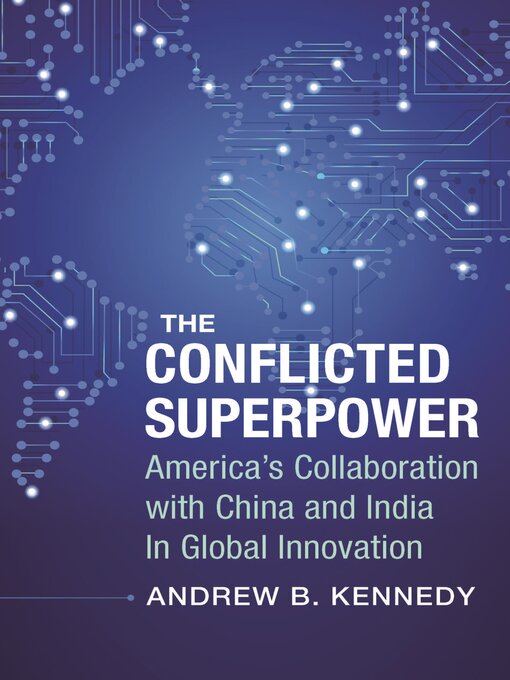For decades, leadership in technological innovation has sustained U.S. power worldwide. Today, however, processes that undergird innovation increasingly transcend national borders. Cross-border flows of brainpower have reached unprecedented heights, while multinationals invest more and more in high-tech facilities abroad. In this new world, U.S. technological leadership increasingly involves collaboration with other countries. China and India have emerged as particularly prominent partners, most notably as suppliers of intellectual talent to the United States. In The Conflicted Superpower, Andrew Kennedy explores how the world's most powerful country approaches its growing collaboration with these two rising powers.
Whereas China and India have embraced global innovation, policy in the United States is conflicted. Kennedy explains why, through in-depth case studies of U.S. policies toward skilled immigration, foreign students, and offshoring. These make clear that U.S. policy is more erratic than strategic, the outcome of domestic battles between competing interests. Pressing for openness is the "high-tech community"—the technology firms and research universities that embody U.S. technological leadership. Yet these pro-globalization forces can face resistance from a range of other interests, including labor and anti-immigration groups, and the nature of this resistance powerfully shapes just how open national policy is. Kennedy concludes by asking whether U.S. policies are accelerating or slowing American decline, and considering the prospects for U.S. policy making in years to come.
The Conflicted Superpower
America's Collaboration with China and India in Global Innovation
-
Creators
-
Series
-
Publisher
-
Release date
April 17, 2018 -
Formats
-
Kindle Book
-
OverDrive Read
- ISBN: 9780231546201
- File size: 1722 KB
-
EPUB ebook
- ISBN: 9780231546201
- File size: 1722 KB
-
-
Languages
- English
-
Reviews
-
Kirkus
Starred review from August 1, 2018
A foreign policy scholar analyzes two decades of American policymaking to better understand the country's uneasy posture toward globalized innovation, research, and development. Kennedy (Public Policy/Australia National Univ.; The International Ambitions of Mao and Nehru, 2011, etc.) has long studied China and India. This book specifically examines the globalization of innovation, focusing on how the United States interacts with these two countries in the high-tech arena. Innovation, he says, increasingly involves collaboration. Modern transportation, information, and communications technologies facilitate cross-border exchanges of ideas, people, and investments--but politics, he points out, can constrain these activities. Kennedy considers policies that regulate admission of skilled immigrants, allocation of foreign student visas, and offshoring of research-and-development services. In the first of five concise, well-organized chapters, he quantifies transnational flows of brainpower and R&D investment, tracking the rise of foreign-born students in higher education, international co-authorship of scientific papers, and overseas laboratories opened by multinational corporations. Next, he characterizes the U.S. high-tech community ("HTC") as an interest group with business and academic wings, and proposes explanations for America's varying levels of openness. The last three chapters test his hypotheses through case studies of immigration, student visas, and offshoring. Kennedy details how the H-1B visa program for skilled workers expanded before 2004, but declined as citizen groups intensified opposition. He finds more consistent policy in soaring F-1 visas for foreign students; a slight decline followed the 9/11 attacks, but the HTC's academic wing faced little opposition in re-establishing an open-door policy. The HTC's business wing, he says, has also been partially successful in defeating anti-offshoring proposals; again, citizen opposition groups proved more decisive than labor. Kennedy concludes that inconsistent American policies toward global innovation reflect domestic political battles, rather than coherent strategy. Drawing on research from 2017, the author also thoughtfully writes about whether anti-immigration fervor will recede after President Donald Trump leaves office, allowing more openness to collaboration with China and India. His last sentence: "Whether the United States will pursue such collaboration in a more intelligent way, one that addresses the shortcomings of its current approach, remains to be seen." Throughout this work, Kennedy effectively demonstrates his thesis that innovation is indeed globalizing. His portrait of an ad-hoc legislative patchwork, driven more by intensity than by majority opinion, raises clear concerns about America's future competitiveness. The text is replete with data and examples and supported with numerous graphs and tables, but the narrative flow never stumbles or feels overburdened. Overall, Kennedy writes with a clarity and command of his subject, and this provides an easy path for readers to follow. Extensive endnotes and a 34-page bibliography substantiate his prodigious research, which includes interviews with 72 sources from government, business, labor and citizen groups in all three nations at hand. As President Trump pursues trade battles abroad and an anti-immigration agenda at home, this cogent work from a seasoned observer of Asia and the United States could not be more timely--or, indeed, more necessary. A must-read for policymakers, but one that's not too wonkish for lay readers.COPYRIGHT(2018) Kirkus Reviews, ALL RIGHTS RESERVED. (Online Review)
-
Formats
- Kindle Book
- OverDrive Read
- EPUB ebook
subjects
Languages
- English
Loading
Why is availability limited?
×Availability can change throughout the month based on the library's budget. You can still place a hold on the title, and your hold will be automatically filled as soon as the title is available again.
The Kindle Book format for this title is not supported on:
×Read-along ebook
×The OverDrive Read format of this ebook has professional narration that plays while you read in your browser. Learn more here.

